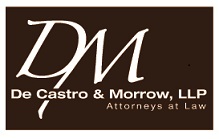Business Case Examples
Business Litigation
Example No. 1: An executive in the entertainment industry retained De Castro & Morrow when she was sued by an individual who was her former partner in a production company. The former partner claimed that De Castro & Morrow’s client had violated the terms of the partnership agreement. After a 3 day arbitration, De Castro & Morrow was able to persuade the arbitrator that no violations had occurred, securing a complete victory for De Castro & Morrow’s client.
Example No. 2: De Castro & Morrow represented a dentist who purchased a lease and dental equipment from another dentist who was moving to a new location. The dentist who was moving initially indicated that he would have to stay in the old space, but would move out within 3 months. 12 months later, the dentist still had not moved. De Castro & Morrow uncovered evidence that when the bad guy signed the agreement to sell to De Castro & Morrow’s client, he knew that a zoning issue would prevent him from moving to his new space and that he would have to start all over in finding and building out a new office. De Castro & Morrow took this matter to arbitration. Not only did De Castro & Morrow force the old dentist out of the space, but also recovered significant damages for its client.
Example No. 3: De Castro & Morrow’s client was a partner in an entertainment company. She wanted a clear accounting of profits and wanted to be bought out of the business. The other partners, however, were not being completely forthcoming with the financial information that was needed to determine the value of the company. De Castro & Morrow stepped in and sued the other partners to obtain the financial information. During discovery, the other partners refused to turn over critical documents. De Castro & Morrow were able to obtain an evidentiary sanction against the other partners that prevented them from introducing any evidence of expenses that the partnership incurred. Thus, the value of the partnership would have to be determined by gross profits only. De Castro & Morrow’s efforts increased the value of the case dramatically. De Castro & Morrow ultimately accepted a settlement in which the other partners paid De Castro & Morrow’s client more than 20 times her initial investment. Not a bad return for a two year investment!
Example No. 4: De Castro & Morrow represented a growing record company that had hired a CPA to prepare its financial documents and file its tax returns. The company gave the CPA some shares in the company in exchange for lower fees. The CPA, however, never properly performed her job and delayed filing tax returns for years. When the company started taking off, it wanted to take back the shares that the CPA held and recover damages. De Castro & Morrow took the case to arbitration and scored a complete victory. De Castro & Morrow demonstrated that the CPA was negligent and that she did not earn any of the shares. The CPA’s shares were stripped from her and De Castro & Morrow’s client recovered damages and attorneys’ fees. De Castro & Morrow then converted the arbitration award into a money judgment.
Real Estate Disputes
Example No. 1: De Castro & Morrow was retained to help a client evict the client’s tenant from an investment property. Without any authority, the tenant had started to make significant changes to the property in violation of the lease. The tenant tried to delay the eviction by filing suit and claiming that he had an ownership interest in the property. The problem with this argument was that the tenant only had an option to purchase the property – and had never exercised the option. The court flatly rejected the tenant’s lawsuit and granted De Castro & Morrow’s client full relief, including attorneys’ fees. De Castro & Morrow then filed suit against the tenant and his attorney for malicious prosecution. The basis for the malicious prosecution suit was that the claim for title had no merit and was obviously filed just to delay the eviction. De Castro & Morrow prevailed on the malicious prosecution case and recovered additional damages from the tenant and his attorney.
Example No. 2: After selling their home, De Castro & Morrow’s clients were sued by the buyer, who claimed that mold existed in the home and that it had not been disclosed. During discovery, David De Castro was able to get the Plaintiff to admit that she never relied on any statements by the sellers during the sale. Armed with this admission, De Castro & Morrow filed a motion for summary judgment and won. De Castro & Morrow then brought a motion for attorneys’ fees. That motion was granted, giving De Castro & Morrow’s client not only a complete victory, but a judgment for attorneys’ fees as well.
Example No. 3: De Castro & Morrow represented a landlord who had recently evicted some tenants. The tenants then filed a claim for retaliatory eviction, claiming that they were evicted only after complaining of poor conditions in the apartment. De Castro & Morrow used its aggressive litigation techniques to get this case completely dismissed. First, De Castro & Morrow served extensive discovery on the other side, who was not equipped to properly respond. De Castro & Morrow continued to turn the heat up with evidence that the tenants had waived their claims when they settled the eviction proceedings. After bombarding the other side with evidence against them, the tenants ultimately dismissed their entire case. Another complete victory for De Castro & Morrow’s client.
